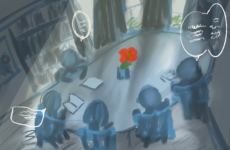
Almost anyone who has walked around campus has heard the common Choate student complaints:
“I’m so tired. This is my third coffee today.”
“I have two tests, three projects, one essay, four meetings …”
“I really hope it rains today so sports practice will be canceled.”
All of the students in the vicinity nod their heads in agreement and add in a few of their own complaints regarding their workload or lack of motivation. It’s normal for conversations among peers to begin with complaints. In fact, complaining has become one of the primary forms of socialization at Choate — throughout my time at Choate, I have started multiple friendships through sounding off on my excessive workload.
While many students are going through very real struggles and should feel comfortable expressing their feelings, the common sources of complaints concern ultimately trivial things, such as a challenging homework assignment, or an unsatisfying meal in the dining hall. This culture of complaining creates a negative atmosphere on campus that often breeds competition between students on who is struggling the most. Oftentimes, it is more common to hear about the trying aspects of the Choate experience rather than the positive ones.
One of the downsides of this imbalance is that it encourages poor behavior by glorifying detrimental practices that come as a result of a rigorous workload. When a student claims to have pulled an all-nighter, it’s said with a sort of pride that makes it seem like I should feel impressed with their work ethic rather than concerned with their lack of sleep. In this way, bad habits are rewarded with social points, and poor mental health is trivialized, even enabled.
To make matters worse, whenever someone complains, others tend to contribute stories of their struggles, as if it’s a competition to see who’s damaging themselves the most. This toxic environment makes it virtually impossible to identify those in need.
The most shocking moment of my Choate career so far occurred during a conversation in the dorm. We were discussing seasonal depression, and my friend said, “I don’t trust anyone who is always happy at Choate.” Everyone immediately agreed and began giving examples of people who seemed “too happy.” We were shaming people for always being positive instead of admiring their personalities. The subject of our complaints was no longer classes or homework, but people. We were divorcing the Choate experience from any kind of happiness.
Social media tends to promote a similar kind of negativity. While posts and stories can highlight our voices, these voices tend to be filled with grumbling and pessimism. Private Snapchat stories are filled with paragraphs and paragraphs of people complaining, and TikTok videos feature dramatic crying over feeling stressed or burnt out. While it is important to talk about the hard things we are going through, it is also important to remember to look for healthy ways of relieving stress.
When we only focus on the downsides, it’s easy to forget how amazing it is to be here at Choate. Words are powerful, and, often, we are not careful enough about how we use them. Recently, I have been trying to focus more on the positive things happening around campus, from fun conversations with my teachers to cool projects that I was assigned in class. If we want the positive to outweigh the negative in our lives, our conversations should reflect that. Rather than sharing our plights, we should strive to connect with people over the things that make us happy here at Choate.




